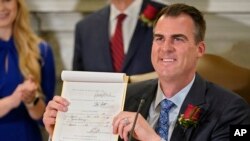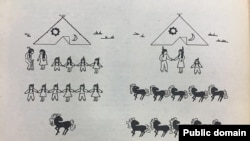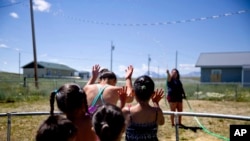Immediately after the Supreme Court's draft opinion to end women's constitutional abortion rights was leaked, Oklahoma Governor Kevin Stitt appeared on Fox News and was tough in Oklahoma. A new abortion ban could "set an abortion on demand" in any of the 39 Indian reserves in that state.
"As you know, the Oklahoma tribe is very generous," Stitt said. "They go to Washington, D.C.. They talk to President Byden (Joe) at the White House. They are adopting those strategies."

The U.S. government recognizes tribes as sovereign nations, so it has passed its own legislation to regulate miscarriage on tribal lands, subject to certain restrictions. You have the right to.
Stitt's comment is Roev. Wade turned over.
Senator Elizabeth Warren and Alexandria Ocasio Cortez called on the White House to free up federal land and resources to provide reproductive health services. Legislators have not mentioned India's reservations, and the tribes have shown no interest in opening shelters for mischief.
"It was a journalist. It was an activist who was looking for some sort of solution," said a citizen of the Cherokee state of Oklahoma and a law professor at Sandradio Connor Law University in Arizona. Stacey's said. "And now, in the last few days, it has begun to escalate, and politicians have almost warned the tribes that they shouldn't do this."
Tuesday, White HouseDenied the possibility thatwould use federal land for abortion services.
However, the conversation on social media still does not stop.
But it's a conversation, but most Native Americans find it problematic, if not unpleasant at all.
"Whenever a tribe is asked to do something that doesn't stem from their thinking process, it's just a stench of further colonization," Leeds said. "As you know, outsiders are trying to tell the local tribal government what their laws and policies should be."
Native Americans from rape and human trafficking in the 1970s Given the well-documented history of sexual violence against indigenous women leading up toforced sterilization, I find the conversation particularly upset.

"And you also have this history of taking native children from their families and communities to boarding schools and being hired by other communities. For many, it's just trauma, "Leeds said.
Roev in 1973. In Wade's decision, the Supreme Court condemned the abortion, but it did not guarantee that it would be accessible to all women. The 1976 Hyde Amendment, which was amended several times later, prohibits the use of federal funds to pay for abortions, except in cases of rape, incest, or endangering the lives of women. Indian Health Service relies on federal funding and is the only healthcare provider available in many native communities.
Looking at the tribes for abortion services is to assume that Native Americans are left-handed monoliths, Leeds said.
"Political, (native) people are everywhere. As you know, it's a big leap to automatically guess that everyone wants this," she said. Said. "And the spiritual traditions of many tribes keep life sacred from start to finish."

In 2010, for example, the Navajo National Supreme Courtruledabout the death of a fetus in a highway collision, It states as follows. Neither of these words accurately conveys the condition of the child, but it can best be described as sacred or sacred. The child is awę ́ę ́ t’áá ’íí dą ́ą ́’hiną ́, alive at conception and fully grown in the care of his mother.
Native Americans rarely have the opportunity to comment on abortion. One exception is the2020 Surveyby the Southwest Women's Law Center and the non-profit Forward Together, which surveyed native American women both inside and outside of New Mexico's bookings. Court ruling.
When asked if they support or disagree with the law that criminalizes abortion doctors, 45% of respondents said they disagree. Twenty-five percent said they supported it, and 27% said they did not have any strong opinion.
"Most of the native women who speak nationwide are angry with the latest Supreme Court decision," Leeds said. "But no one claims that their community will be the savior of all other communities."
The tribe is a sovereign nation and on the territory of the tribe's land. You have the right to pass your own legislation that regulates miscarriage. However, the criminal jurisdiction of the Indian country is complicated. Whether a tribal, state, or federal government has jurisdiction depends on the nature of the crime, the identities of the perpetrators and victims, and where the crime occurs.
In theory, the tribe could have a miscarriage, Leeds said, but only at the tribal-funded facilities where indigenous practitioners provided indigenous patients. Anyone else may be subject to state or federal law.
"And that's the fascinating part of the whole conversation," Leeds said. "You want to put the tribes at this risk, which can have an indefinite negative impact on their entire world. People don't understand what they really want."
The U.S. Supreme Courtsaid on Wednesdaythat Oklahoma would be allowed to sue non-native Americans for crimes committed by booking if the victim was native. I made a decision. This is a decision to reduce the court's 2020 decision. Most of eastern Oklahoma (about 43% of the state) remains an Indian reserve.
Stittcelebrated the decision
"Today, our efforts proved to be worthwhile, and the court found that the country of India was part of the state. And supported not being separated from the state. ”
In May, Oklahoma passed the country'sstrictest abortion banWednesday's ruling was a tribe in that state. Reduce the possibility of abortion shelters.


